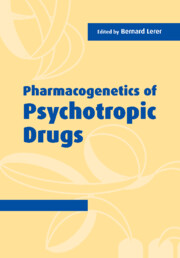Book contents
- Frontmatter
- Contents
- List of contributors
- Part I Introduction
- Part II Clinical background and research design
- Part III Molecular background
- Part IV Pharmacokinetics
- Part V Specific psychotropic drugs and disorders
- 10 Clozapine response and genetic variation in neurotransmitter receptor targets
- 11 Genetic factors underlying drug-induced tardive dyskinesia
- 12 Functional gene-linked polymorphic regions in pharmacogenetics
- 13 Alternative phenotypes and the pharmacogenetics of mood and anxiety disorders
- 14 Pharmacogenetics of anxiolytic drugs and the GABA–benzodiazepine receptor complex
- 15 Genetic factors and long-term prophylaxis in bipolar disorder
- 16 Genetic influences on responsiveness to anticonvulsant drugs
- 17 Apolipoprotein E as a marker in the treatment of Alzheimer's disease
- 18 Genetic variation and drug dependence risk factors
- Part VI Pharmacogenetics and brain imaging
- Part VII Industry perspectives
- Index
11 - Genetic factors underlying drug-induced tardive dyskinesia
from Part V - Specific psychotropic drugs and disorders
Published online by Cambridge University Press: 20 August 2009
- Frontmatter
- Contents
- List of contributors
- Part I Introduction
- Part II Clinical background and research design
- Part III Molecular background
- Part IV Pharmacokinetics
- Part V Specific psychotropic drugs and disorders
- 10 Clozapine response and genetic variation in neurotransmitter receptor targets
- 11 Genetic factors underlying drug-induced tardive dyskinesia
- 12 Functional gene-linked polymorphic regions in pharmacogenetics
- 13 Alternative phenotypes and the pharmacogenetics of mood and anxiety disorders
- 14 Pharmacogenetics of anxiolytic drugs and the GABA–benzodiazepine receptor complex
- 15 Genetic factors and long-term prophylaxis in bipolar disorder
- 16 Genetic influences on responsiveness to anticonvulsant drugs
- 17 Apolipoprotein E as a marker in the treatment of Alzheimer's disease
- 18 Genetic variation and drug dependence risk factors
- Part VI Pharmacogenetics and brain imaging
- Part VII Industry perspectives
- Index
Summary
OVERVIEW
Tardive dyskinesia (TD) affects about one fifth of schizophrenia patients following chronic exposure to dopamine receptor antagonist drugs. Spontaneous dyskinesia has been reported in unmedicated schizophrenia patients and patients with TD have been reported to show distinct clinical features, suggesting a common underlying phenotype that may bear a distinct genetic predisposition. Drug- and patient-related risk factors for the development of TD have received much research attention but appear to predict only a minor part of the variance in the incidence of TD. Genetically determined individual variability in factors affecting drug levels, as well as compensatory responses to chronic dopaminergic antagonism, may account for a major portion of the variance in the incidence of TD. To-date, however, there has been a conspicuous lack of studies exploring a genetic predisposition to TD. Current data stem from sporadic clinical observations and from supportive, albeit indirect, evidence from rodent studies showing strain differences in behavioral and phamacodynamic models for drug-induced TD. Despite the lack of an established genetic contribution or mode of inheritance for vulnerability to develop TD, in recent years a number of groups have ventured to examine directly a possible contribution of specific candidate genes to TD, employing case-control association design in chronically medicated schizophrenia patients. Such studies report direct association of candidate polymorphic genes with drug-induced TD, providing further support for the existence of a genetic contribution and suggesting the likelihood of a polygenic, multifactorial inheritance for such vulnerability.
Keywords
- Type
- Chapter
- Information
- Pharmacogenetics of Psychotropic Drugs , pp. 245 - 266Publisher: Cambridge University PressPrint publication year: 2002
- 2
- Cited by



